
In Western anthropology, philosophy, and literature, the noble savage is a stock character who is uncorrupted by civilization. As such, the noble savage symbolizes the innate goodness and moral superiority of a primitive people living in harmony with Nature. In the heroic drama of the stageplay The Conquest of Granada by the Spaniards (1672), John Dryden represents the noble savage as an archetype of Man-as-Creature-of-Nature.
Anarcho-primitivism, also known as anti-civilization anarchism, is an anarchist critique of civilization that advocates a return to non-civilized ways of life through deindustrialization, abolition of the division of labor or specialization, abandonment of large-scale organization and all technology other than prehistoric technology and the dissolution of agriculture. Anarcho-primitivists critique the origins and allegedly progress of the Industrial Revolution and industrial society. According to anarcho-primitivists, the shift from hunter-gatherer to agricultural subsistence during the Neolithic Revolution gave rise to coercion, social alienation, and social stratification.
Green anarchism, also known as ecological anarchism or eco-anarchism, is an anarchist school of thought that focuses on ecology and environmental issues. It is an anti-capitalist and anti-authoritarian form of radical environmentalism, which emphasises social organization, freedom and self-fulfillment.
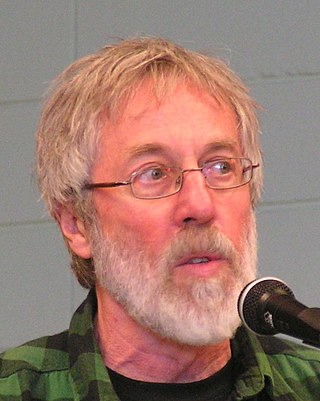
John Edward Zerzan is an American anarchist and primitivist author. His works criticize agricultural civilization as inherently oppressive, and advocates drawing upon the ways of life of hunter-gatherers as an inspiration for what a free society should look like. Subjects of his criticism include domestication and symbolic thought.
Fredy Perlman was an American author, publisher, and activist. His best-known work, Against His-Story, Against Leviathan!, retells the historical rise of state domination through the Hobbesian metaphor of the Leviathan.
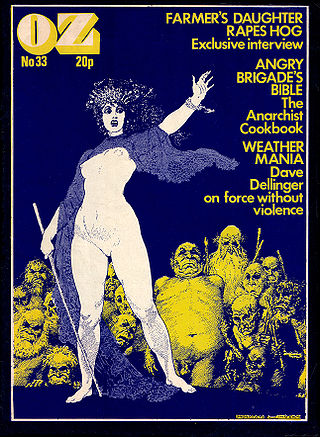
The terms underground press or clandestine press refer to periodicals and publications that are produced without official approval, illegally or against the wishes of a dominant group. In specific recent Asian, American and Western European context, the term "underground press" has most frequently been employed to refer to the independently published and distributed underground papers associated with the counterculture of the late 1960s and early 1970s in India and Bangladesh in Asia, in the United States and Canada in North America, and the United Kingdom and other western nations. It can also refer to the newspapers produced independently in repressive regimes. In German occupied Europe, for example, a thriving underground press operated, usually in association with the Resistance. Other notable examples include the samizdat and bibuła, which operated in the Soviet Union and Poland respectively, during the Cold War.
The Underground Press Syndicate (UPS), later known as the Alternative Press Syndicate (APS), was a network of countercultural newspapers and magazines that operated from 1966 into the late 1970s. As it evolved, the Underground Press Syndicate created an Underground Press Service, and later its own magazine. For many years the Underground Press Syndicate was run by Tom Forcade, who later founded High Times magazine.

John Sinclair is an American poet, writer, and political activist from Flint, Michigan. Sinclair's defining style is jazz poetry, and he has released most of his works in audio formats. Most of his pieces include musical accompaniment, usually by a varying group of collaborators dubbed Blues Scholars.
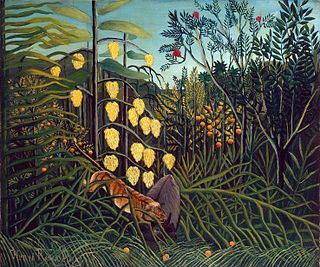
In the arts of the Western World, Primitivism is a mode of aesthetic idealization that means to recreate the experience of the primitive time, place, and person, either by emulation or by re-creation. In Western philosophy, Primitivism proposes that the people of a primitive society possess a morality and an ethics that are superior to the urban value system of civilized people; thus, in art and in philosophy, primitivism is nostalgia for a non-existent golden age.
In the United States, anarchism began in the mid-19th century and started to grow in influence as it entered the American labor movements, growing an anarcho-communist current as well as gaining notoriety for violent propaganda of the deed and campaigning for diverse social reforms in the early 20th century. By around the start of the 20th century, the heyday of individualist anarchism had passed and anarcho-communism and other social anarchist currents emerged as the dominant anarchist tendency.

Stanford Robert Ovshinsky was an American engineer, scientist and inventor who over a span of fifty years was granted well over 400 patents, mostly in the areas of energy and information. Many of his inventions have had wide-ranging applications. Among the most prominent are: the nickel-metal hydride battery, which has been widely used in laptop computers, digital cameras, cell phones, and electric and hybrid cars; flexible thin-film solar energy laminates and panels; flat screen liquid crystal displays; rewritable CD and DVD discs; hydrogen fuel cells; and nonvolatile phase-change memory.

Harry Haywood was an American political activist who was a leading figure in both the Communist Party of the United States (CPUSA) and the Communist Party of the Soviet Union (CPSU). His goal was to connect the political philosophy of the Communist Party with the issues of race.
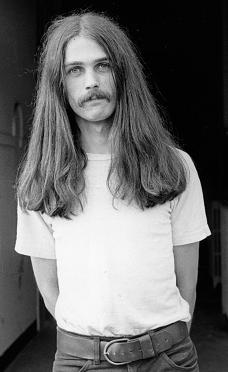
Gary Grimshaw was an American graphic artist active in Detroit and San Francisco who specialized in designing rock concert posters. He was also a radical political activist with the White Panther Party and related organizations.

Harvey Kurek Ovshinsky is an American writer, story consultant, media producer, and teacher, and has been described as "one of this country’s finest storytellers" by the Detroit News. The Metro Times called Ovshinsky's career chronicling life in Detroit during the 1960s, 70s, 80s, and 90s "a colorful and fantastic voyage, at times brave and visionary," spanning the universe of print, broadcast television and radio, and digital storytelling.
Criticism of technology is an analysis of adverse impacts of industrial and digital technologies. It is argued that, in all advanced industrial societies, technology becomes a means of domination, control, and exploitation, or more generally something which threatens the survival of humanity. Some of the technology opposed by the most radical critics may include everyday household products, such as refrigerators, computers, and medication. However, criticism of technology comes in many shades.
Iris M. Ovshinsky was an American businesswoman and scientist, and the co-founder of Energy Conversion Devices with her husband Stanford R. Ovshinsky, serving as its Vice President from its founding in 1960 until her death.
The Detroit Tribune was a newspaper in Detroit, Michigan, United States, was started as the Daily Tribune in 1849 and used the name until 1862. In 1862 the Tribune joined with the (Detroit) Daily Advertiser which then absorbed other papers, becoming the Advertiser and Tribune.
Eddie "Guitar" Burns was an American Detroit blues guitarist, harmonica player, singer and songwriter. His career spanned seven decades. Among Detroit bluesmen, Burns was deemed to have been exceeded in stature by only John Lee Hooker.
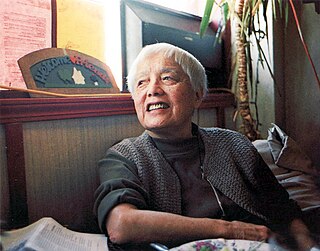
Grace Lee Boggs was an American author, social activist, philosopher, and feminist. She is known for her years of political collaboration with C. L. R. James and Raya Dunayevskaya in the 1940s and 1950s. In the 1960s, she and James Boggs, her husband of some forty years, took their own political direction. By 1998, she had written four books, including an autobiography. In 2011, still active at the age of 95, she wrote a fifth book, The Next American Revolution: Sustainable Activism for the Twenty-First Century, with Scott Kurashige and published by the University of California Press. She is regarded as a key figure in the Asian American, Black Power, and Civil Rights movements.

Industrial Society and Its Future, generally known as the Unabomber Manifesto, is a 1995 anti-technology essay by Ted Kaczynski, the "Unabomber". The manifesto contends that the Industrial Revolution began a harmful process of natural destruction brought about by technology, while forcing humans to adapt to machinery, creating a sociopolitical order that suppresses human freedom and potential. The 35,000-word manifesto formed the ideological foundation of Kaczynski's 1978–1995 mail bomb campaign, designed to protect wilderness by hastening the collapse of industrial society.











